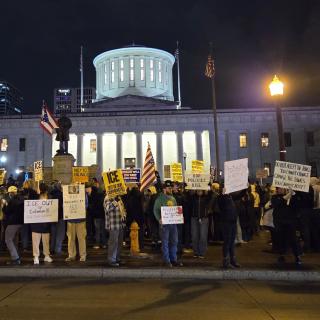In the aftermath of the Donovan Lewis shooting, Cynthia Brown, a past Free Press Hero, traveled to eastern and northeastern Ohio seeking signatures and support for her effort to put a citizen-led initiative on a future statewide ballot. The initiative will let Ohio decide on whether it should change the Ohio Constitution by eliminating qualified immunity for law enforcement and other professions.
When Brown was in Akron, word got around to a local group of nuns she was advocating to end qualified immunity. The convent where these nuns live will go unnamed for fear of retaliation.
Not only did the nuns want to sign the petition they also wanted to collect signatures. Brown and her umbrella organization, the Ohio Coalition to End Qualified Immunity, gladly handed over a stack of petitions.
“I’m Catholic,” said Brown, “I should have pitched it to the church myself. But the Catholic church [in Akron] reached out to me first.”
Word must travel fast amongst devout Catholic sisters. A group of Columbus nuns also reached out to Brown.
For Ohio citizens seeking to change the state constitution the Ohio Attorney General’s office controlled by Republican David Yost requires 1,000 signatures for the state to even consider whether citizens can proceed to the major petition process. If the petition is approved, then the state calls for over 400,000 signatures to make it on a statewide ballot.
So far, Yost’s office has rejected Ohio Coalition to End Qualified Immunity’s (OCTEQI) first two initial submissions. The OCTEQI is scheduled to submit a third time on September 24.
“We realize we needed 3,000 signatures to prevent our petitions from being rejected for frivolous reasons,” said Brown.
Criminal justice professionals told the Free Press that Donovan Lewis’s killer cop Ricky Anderson is likely to be charged with manslaughter and face a 5-to-10-year sentence, but predictably, the trial won’t begin until 2024.
Qualified immunity shields law enforcement and other state actors from personal liability (civil suits) after they make the wrong call, for instance, on split-second decisions. Police argue qualified immunity protects them from making life-or-death decisions, and if were to end in Ohio, officers would quit in droves.
One bottom line, says Brown, is that taxpayers have paid over a billion for police misconduct. She says the financial toll should be placed on the officers themselves and should be made to purchase mandatory professional liability insurance.
Qualified immunity is also unconstitutional, believes Brown who lost a nephew to Columbus police.
“We are asking, what is common sense? Do not kill people when they are not posing a threat,” says Brown. “I strongly believe if [law enforcement] knew the taxpayers were no longer paying out millions of tax dollars, but they have to accept full responsibility for abuse, this horrific trend would de-escalate.
“Currently, the way police use force is dangerous and reckless and jeopardizes officer and citizen safety. Ending qualified immunity will not immediately change how the police use force, but it will provide a remedy if that force is used unjustly.”
In the fateful year of 2020, the OCTEQI urged the Ohio Statehouse to pass its own legislation to end qualified immunity. At that time, the Ohio Senate President Larry Obhof (R-Ashtabula) reached out to Brown to discuss possible public safety de-escalation policies. Brown was also led to believe Ohio Republicans would co-sponsor legislation to end qualified immunity with Ohio Democrats. Co-sponsorship never materialized, and the Ohio Dems’ legislation fizzled out, as both GOP-controlled Ohio House and Senate wouldn’t even give the proposed legislation a hearing, said Brown.
“The bottom line is this, the Ohio Coalition to End Qualified Immunity has exhausted all remedies with the Republican leadership in the House and Senate,” said Brown.
Ending Qualified Immunity has recent precedent. Connecticut, Colorado, New Mexico, and New York City have, over the last several years, ended qualified immunity altogether or limited its powers.
“The Ohio Coalition to End Qualified Immunity strongly believes ending qualified immunity is a good first start when bad police officers are killing unarmed men, women and minors in Ohio,” says Brown.



